Intel Xeon Gold 5218 Benchmarks
For this exercise, we are using our legacy Linux-Bench scripts which help us see cross-platform “least common denominator” results we have been using for years as well as several results from our updated Linux-Bench2 scripts. Starting with our 2nd Generation Intel Xeon Scalable benchmarks, we are adding a number of our workload testing features to the mix as the next evolution of our platform.
At this point, our benchmarking sessions take days to run and we are generating well over a thousand data points. We are also running workloads for software companies that want to see how their software works on the latest hardware. As a result, this is a small sample of the data we are collecting and can share publicly. Our position is always that we are happy to provide some free data but we also have services to let companies run their own workloads in our lab, such as with our DemoEval service. What we do provide is an extremely controlled environment where we know every step is exactly the same and each run is done in a real-world data center, not a test bench.
We are going to show off a few results, and highlight a number of interesting data points in this article.
Python Linux 4.4.2 Kernel Compile Benchmark
This is one of the most requested benchmarks for STH over the past few years. The task was simple, we have a standard configuration file, the Linux 4.4.2 kernel from kernel.org, and make the standard auto-generated configuration utilizing every thread in the system. We are expressing results in terms of compiles per hour to make the results easier to read:
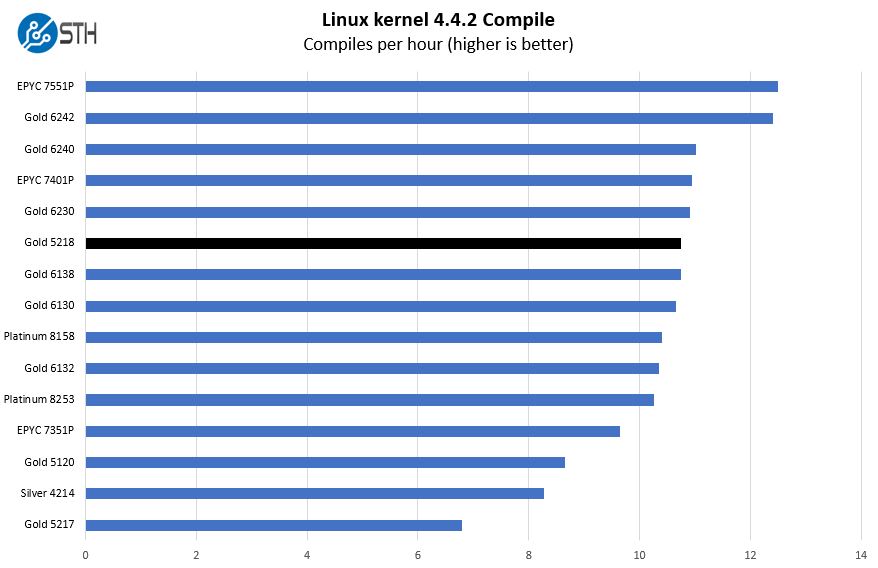
Immediately what should pop-out on this chart is that the new Intel Xeon Gold 5218 is competitive with the previous generation Intel Xeon Gold 6130 here. That is a big move up the stack for the part. That is largely driven by matching the previous-generation core count at only around two-thirds of the previous price point.
c-ray 1.1 Performance
We have been using c-ray for our performance testing for years now. It is a ray tracing benchmark that is extremely popular to show differences in processors under multi-threaded workloads. We are going to use our 8K results which work well at this end of the performance spectrum.
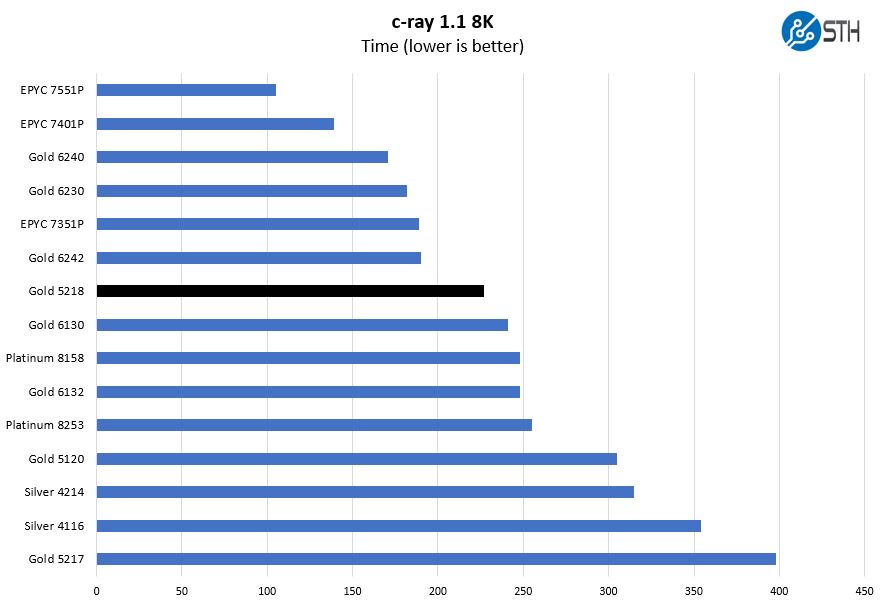
AMD typically dominates this test in our suite. As a result, we see the Intel Xeon Gold 5218 all behind the AMD EPYC 7351P 16-core part. AMD has a microarchitectural advantage in this workload which leads to this result.
7-zip Compression Performance
7-zip is a widely used compression/ decompression program that works cross-platform. We started using the program during our early days with Windows testing. It is now part of Linux-Bench.
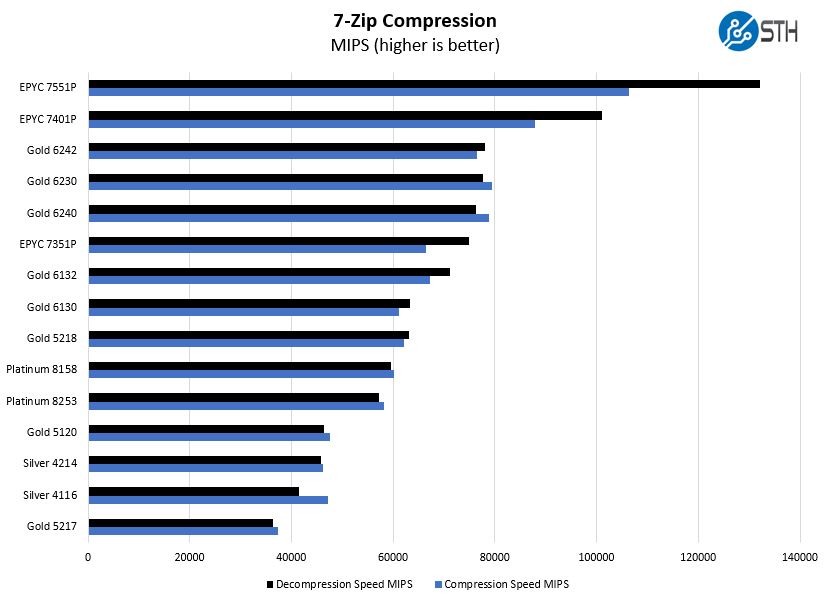
Here, performance bests a $3100 Intel Xeon Platinum 8253 from this generation. The Platinum 8253 is also a 16 core part, but with a lower maximum turbo clock. In general, for single and dual-socket servers we recommend the Intel Xeon Gold 5218 over the Xeon Platinum 8253.
NAMD Performance
NAMD is a molecular modeling benchmark developed by the Theoretical and Computational Biophysics Group in the Beckman Institute for Advanced Science and Technology at the University of Illinois at Urbana-Champaign. More information on the benchmark can be found here. With GROMACS we have been working hard to support AVX-512 and AVX2 supporting AMD Zen architecture. Here are the comparison results for the legacy data set:
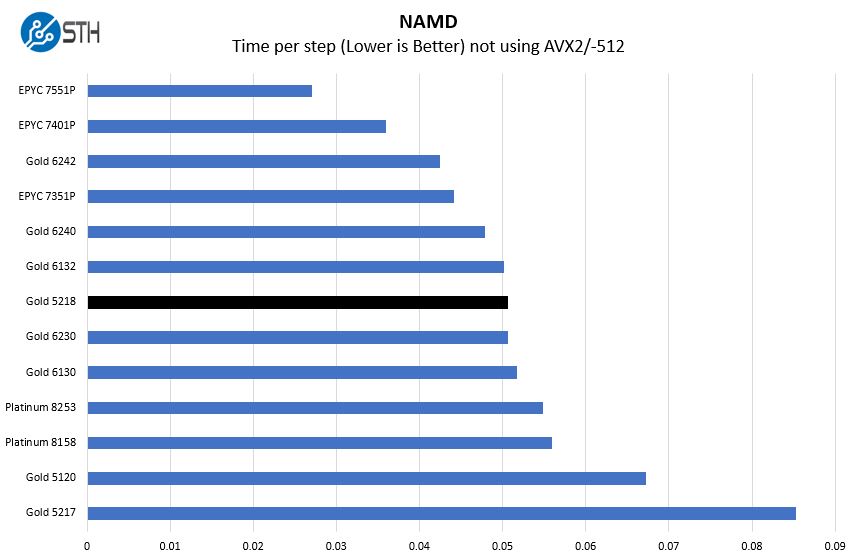
Performance is overall good here, although the more interesting result may be the GROMACS results in this arena.
OpenSSL Performance
OpenSSL is widely used to secure communications between servers. This is an important protocol in many server stacks. We first look at our sign tests:
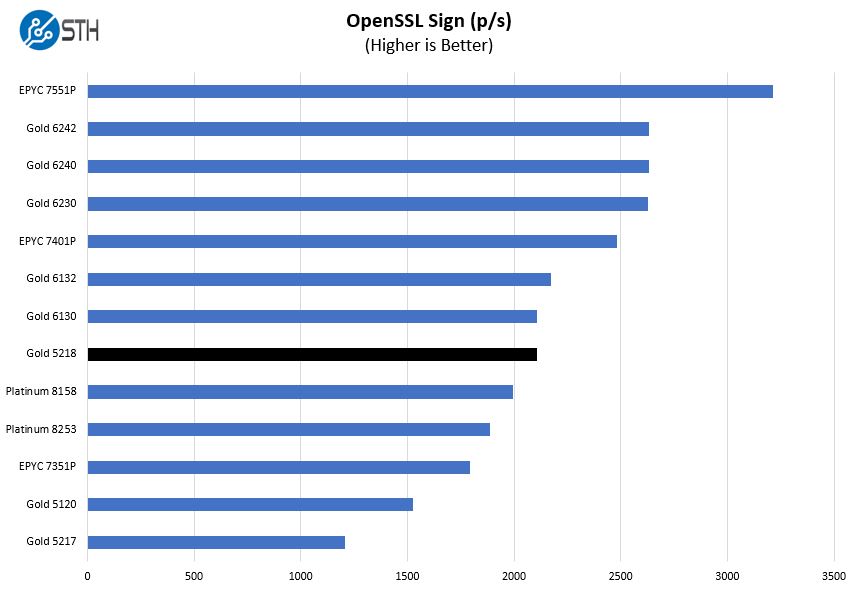
Here are the verify results:
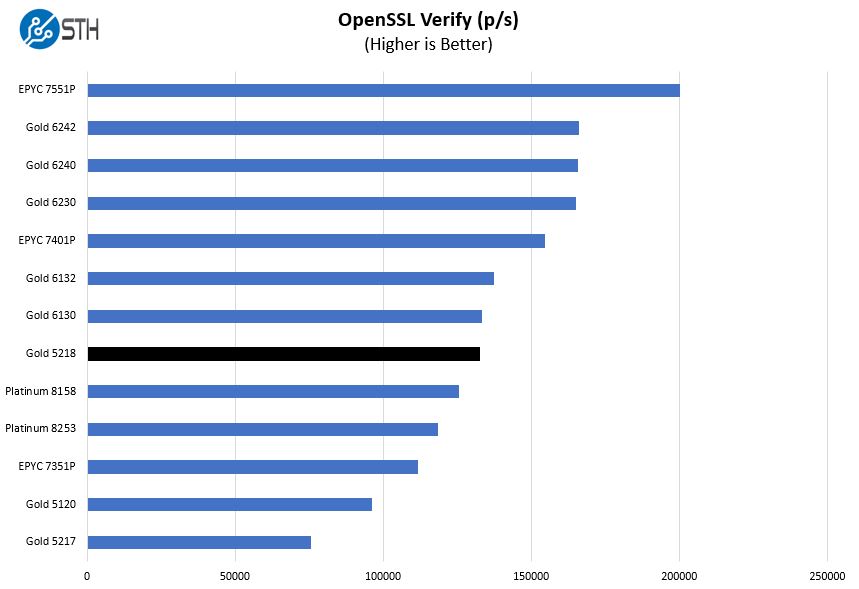
OpenSSL is a foundational technology in enterprise applications. We were a bit surprised to see that over the runs the Xeon Gold 5220 and Gold 6230 were so close. The variance on the Gold 6230 was lower and overall the Gold 6230 was still faster. There seem to be some TDP related constraints here where even adding more cores in the same TDP is not helping as much as we would expect.
UnixBench Dhrystone 2 and Whetstone Benchmarks
Some of the longest-running tests at STH are the venerable UnixBench 5.1.3 Dhrystone 2 and Whetstone results. They are certainly aging, however, we constantly get requests for them, and many angry notes when we leave them out. UnixBench is widely used so we are including it in this data set. Here are the Dhrystone 2 results:
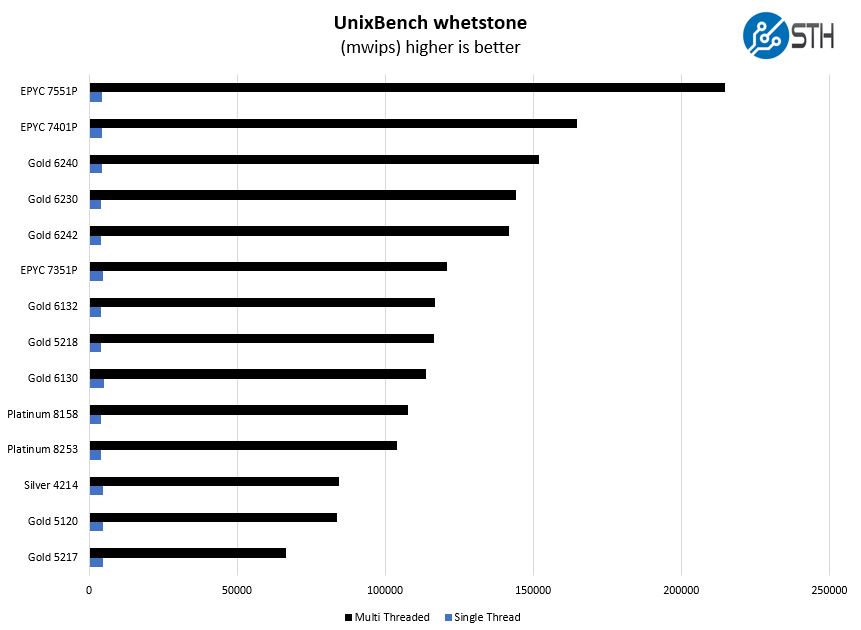
Here are the whetstone results:
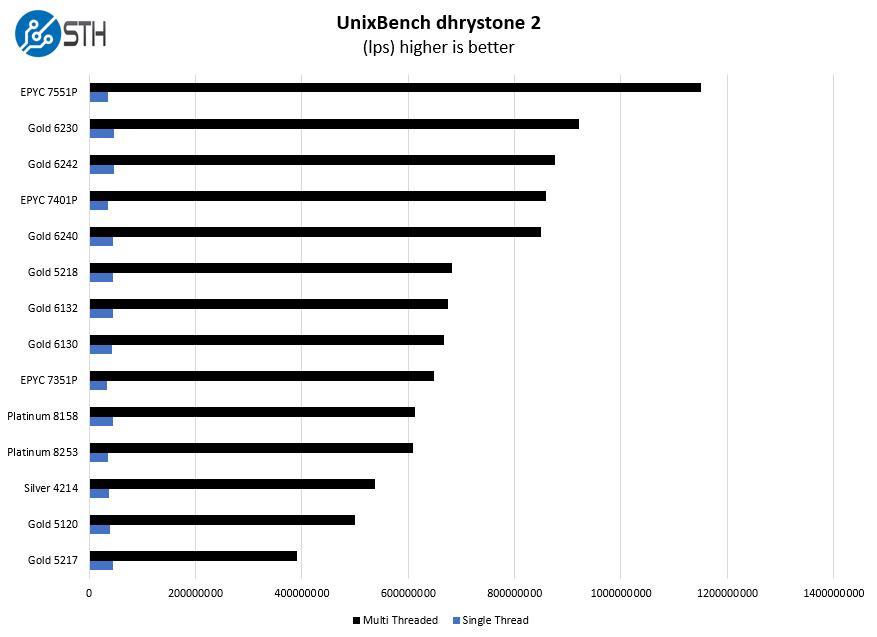
Again, we see performance on part with, if not slightly better than the previous-generation Intel Xeon Gold 6130. If you are shopping for a server and want a similar level of performance as the previous-gen Gold 6130 but at a lower price point, the Xeon Gold 5218 is likely what we would recommend.
GROMACS STH Small AVX2/ AVX-512 Enabled
We have a small GROMACS molecule simulation we previewed in the first AMD EPYC 7601 Linux benchmarks piece. In Linux-Bench2 we are using a “small” test for single and dual-socket capable machines. Our GROMACS test will use the AVX-512 and AVX2 extensions if available.
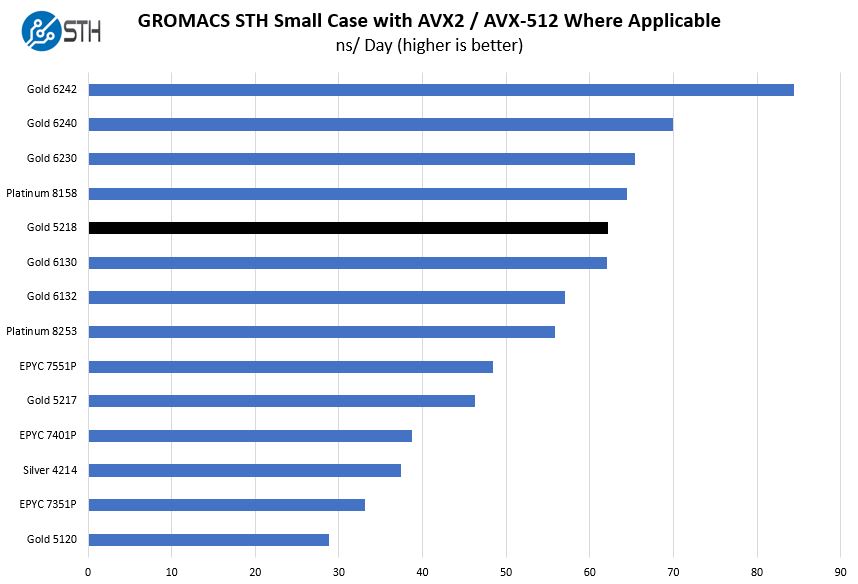
Here performance is excellent. Intel confirmed that these chips only have single port FMA AVX-512. At the same time, we are seeing it run even with the previous-generation, similarly clocked, Intel Xeon Gold 6130 with dual-port FMA AVX-512. The Intel Xeon Gold 5218 is slightly faster in this benchmark but it also has a 200MHz base and maximum turbo frequency advantage over the previous-gen part.
Chess Benchmarking
Chess is an interesting use case since it has almost unlimited complexity. Over the years, we have received a number of requests to bring back chess benchmarking. We have been profiling systems and are ready to start sharing results:
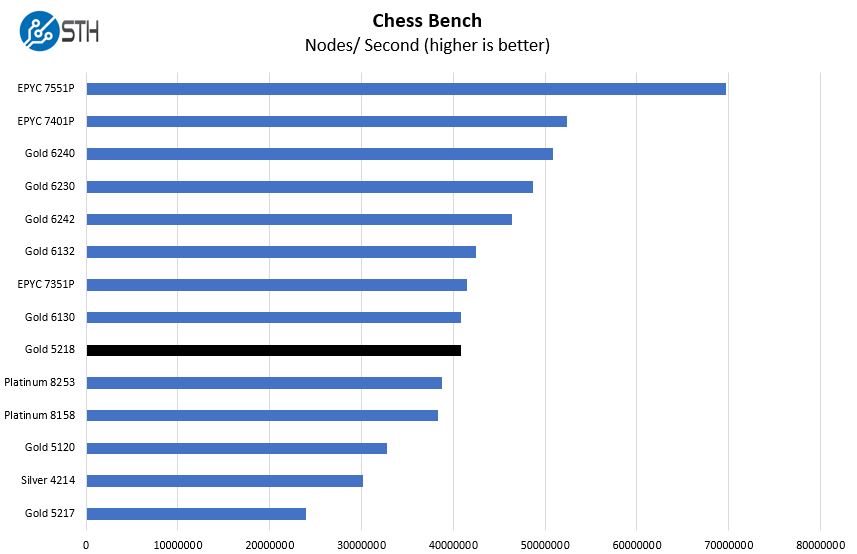
Here we see performance is well above the previous-generation Intel Xeon Gold 5120, the top-performer in the last generation of Xeon Gold 5100 CPUs. Intel is clearly showing a commitment to the mainstream market by bringing more performance at the same or lower price points.
Next, we are going to discuss the solution’s market positioning and then give our final thoughts.


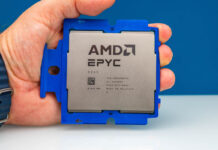
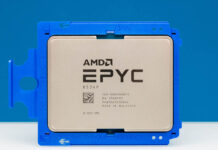
I’m getting all of our customer’s re-buy servers re-quoted with newer gen2’s because of performance bumps like this for free in the socket.
What would be interesting to see is the placement of 5218 vs 4215. Both support Optane memory, but the latter with half the core-count.
This 5218 Gen2 slaps around my originally priced $1900 Gold 6130 Gen1 in just about every way.
I’m preparing for 2nd CPU to pair with my single 6130 but disheartening to spend so much for a Gen1. Maybe I should consider selling my single 6130 and go for two Gold 5218 or even two 5220.
Eh, I’ll wait. I have enough cores for what I’m doing now anyway.
If was in the fase of upgrading a proxmox VPS server, from 2x Intel Xeon silver 4114, which one would you choose of these 2?
Intel Xeon Silver 4216 @ 2.10GHz
Intel Xeon Gold 5218 @ 2.30GHz
Intel Xeon Gold 5218 2.3G latest procured process in USGI environment. Kindly share news letter on following email address.
Intel Xeon Gold 5218 2.3G latest procured process in USGI environment. Kindly share news letter on following email address. Also share on my personal ID